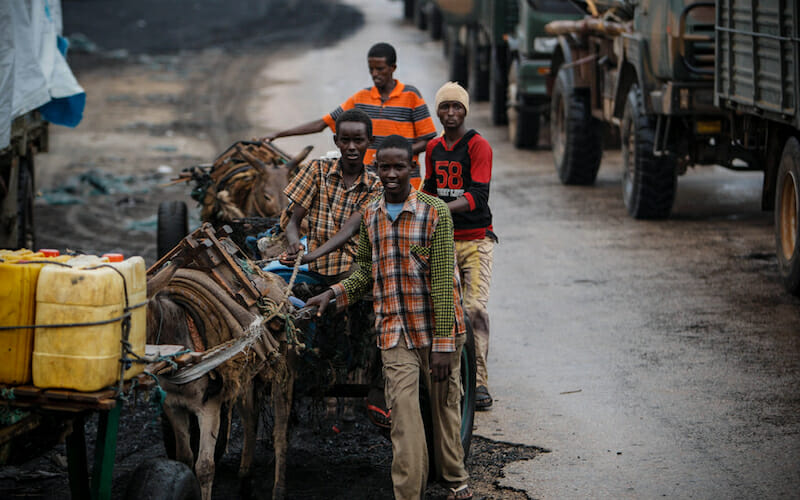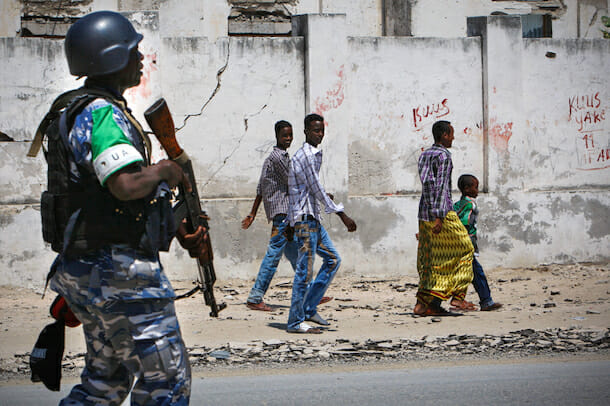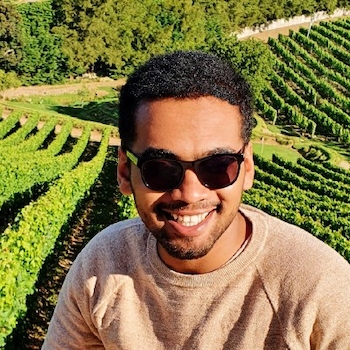
My Strategies for a Stable Africa
The White Nile running through the African expanse and the Blue Nile running from the Ethiopian Highlands meet in an ever so distinguishable confluence known in Arabic as “Al-Mogran.” Each branch of the great river brings with it to Khartoum, the diversity, culture, and history of its people, but blood and tears can be sensed in its waters too. Some say Sudan is so divided that not even the Nile can hold it together. I have always refused to believe so. One day the great river glistened in the moonlight while I sat with my uncles sipping tea placidly, enjoying the river’s breeze with content.
“This tea and these chairs are all that support my family,” Awadeya the kindly tea-seller remarked. I came to learn that she was from Darfur: one of the many war-torn regions in Sudan. She told us of her family – seven children who lost their father, her husband, in the war – and of her journey to Khartoum in search of the work and means needed to support her family. She made me well-aware of the fact that it wasn’t as simple as what I had seen on television; how there were weeks filled with fear and heated anticipation even before the camera was turned on. She told us of how her people couldn’t speak over morning or evening tea because the war planes would swallow any and all sound, how the emaciated ribs of children and circling vultures were commonly sighted with the internecine fighting. Since then I have continuously deliberated on how such atrocities could be allowed to be inflicted upon living, thinking, feeling human beings – Africans of the same soil and language as the perpetrators themselves. My initial anger and sentiment turned me towards the path of thinking up solutions for conflict and suffering of the like. I was driven by my ambitions for peace on the African continent. The following exposition sets forth the goal of communicating my findings and proposals.
“Peace cannot be kept by force; it can only be achieved by understanding,” the physicist Albert Einstein once remarked. While it is true that there will always be conflict, I believe that it is the manner by which we deal with that conflict that will move us forward (or backward). Conflict does not necessarily mean war. An educated society is less likely to resort to full-scale war and is more likely to be inclined towards debate and compromise. Moreover, the benefits experienced by an educated society or the set-backs experienced by a benighted one can stem from the stability of their environments. In Africa, a large percentage of our diaspora are equipped in areas of expertise. Trained medical doctors, scientific researchers, engineers, economists, teachers, nurses and actuaries all leave their countries and sometimes even the continent in search of better pay, better jobs and more opportunities. In times of instability and war, young gifted individuals who may have had the potential to become the next Einstein or Witten, by virtue of their natural instinct, are more concerned with their survival than their education, needless to say, a colossal loss for the African continent.
Critics may contend and bring up Zimbabwe as an example of a well-educated country that has not flourished; however the problems facing Zimbabwe are political, and economic in nature and it has been largely at peace — by virtue of its educated people. It is important to note that education is a long term strategy for sustained peace and security in Africa. It is a strategy that is preventative in nature. However, once its benefits are reaped fully, education will bring forth times of prosperity. A large proportion of conflicts in Africa are rooted in the scramble for resources, conflict in the great lakes region is an example. An educated society is also likely to innovate, allowing for sustainable use of natural resources where all may reap the benefits.

Today, practically every African conflict has some ethno-regional dimension to it. Warlords disseminate propaganda against their enemies in order to gain popular support, adding fuel to an already raging conflagration. Propaganda, to put it simply, is a powerful tool. While it is most evident in times of war, it is constantly being used as a political and social means in ever more surreptitious ways to sway people’s attitudes. This is apparent in election commercials on TV, where candidates employ propaganda techniques to elevate themselves above their opponents. I propose using propaganda for peaceful means. The unity of a nation can be built by propaganda which disseminates ideas of “oneness” with a focus on diversity amongst a people. This can build a nationalistic framework with which all can identify without any distinctions based on race, religion, tribe or homeland creating a nation that encompasses the entire country. For nations which are divided as a consequence of their intrinsic nature, states where sectarianism is deep-rooted, propaganda can be used to build an inclusive identity that allows different factions to still assert their separate ones.
As an African leader I would find a focal point of commonality amongst my people, be it a language, religious, cultural or a regional view or a common goal that can be related to by the entire populace in order to build a nation-state. An example of this method’s successful deployment may be found in Tanzania. The promulgation of Kiswahili as a national language was a central factor in the conception and sustenance of a culture of peace in the state. A Tanzanian who chose to leave his own community could move to a new area and settle there in amity. Tanzanians therefore experienced peace that was not only the absence of war, but was also the effect of an effort to create a nation whose people saw a common unity among themselves and thus had similar aspirations.
The aspirations of a nation are indeed the aspirations of its youth. The majority of young people across Africa have relatively conventional aspirations for their lives. They would like an education, convenient jobs to support their families and financial security. There are, however, very few surveys of the backgrounds and aspirations of young soldiers in Africa. The sociological or economic analysis of the youth and their needs and strategies for survival is a largely unstudied field. Any comprehensive plans for bringing stability to Africa must include intensive study of these inquiries. As an African leader I would ensure that they are studied in depth, and with the procurement of that knowledge implement innovative policies focused on guiding youth.
The organization of youth is perhaps a most vital matter in our journey towards sustainable peace and security in Africa. Male youth in particular —are seen as combative, rebellious, impatient, malleable, and risk-taking. These characteristics are often exploited by warlords and radical groups for their own benefit. Some writers, observing the apparently unrestrained and irrational violence of the wars in Sierra Leone and Liberia, have hypothesized that Africa’s youth are out of control; I refuse to believe this postulation for I believe that the writers have not looked at the situation from the point of view of young people. However, I do put forward a number of solutions: firstly, the organization of youth into student unions; they are largely representative and influential civil organizations for youth.
Student politics has a disproportionate influence in many African countries. In 1964 it was the Khartoum Student Union that sparked the ‘October Revolution’ that brought down the military dictatorship of General Ibrahim Abboud and in 1976 it was the youth who fought for the reformation of the Apartheid education system in South Africa, one of the contributions that ultimately brought an end to that brutal system. Secondly, the organizations of youth into moderate religious organizations such as church, mosque or traditional African groups for youth, often succeed in capturing the energies and commitment of their members. Finally, I propose the organization of youth into extracurricular groups such as sports or art groups. These allow youth to not only engage themselves, but it also allows them to build bonds with members of other ethnic groups, although a small contribution, they bring about that sense of unity and thus peace itself.
I ardently believe that with the aforementioned strategies, African leaders can create sustained peace and security in Africa. Peace for our all our citizens from Awadeya, the tea-seller, and her family to the chairperson of the AU, regardless of ethnicity, background or any other parameter. Let us bring forth the Africa we have always desired
